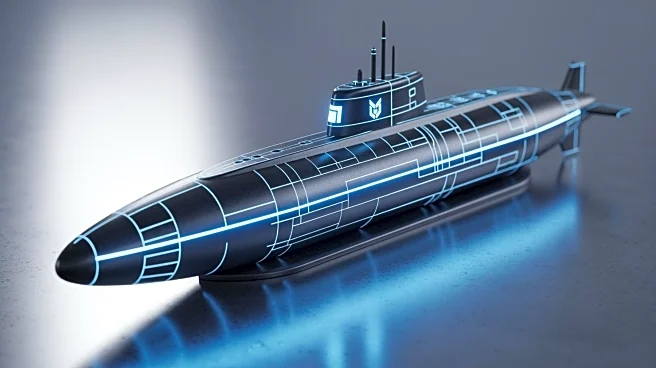What's Happening?
The United States has granted South Korea approval to construct a nuclear-powered submarine, marking a significant shift in the military dynamics of the region. This development was announced by President
Trump during his visit to Asia, where he also revealed plans for nuclear submarines to be built at Philadelphia shipyards. The approval is part of a broader economic agreement, with South Korea set to invest $350 billion in the U.S. The move positions South Korea among a select group of nations with nuclear submarine capabilities, enhancing its ability to operate independently in maritime defense. This strategic decision is seen as a step towards South Korea assuming greater responsibility for its own defense, particularly in the context of its alliance with the United States.
Why It's Important?
The approval for South Korea to build a nuclear-powered submarine is a pivotal moment in U.S.-South Korea relations, potentially altering the balance of power in the Asia-Pacific region. By enabling South Korea to enhance its naval capabilities, the U.S. is encouraging its ally to take on more of the security burden, particularly in monitoring Chinese and North Korean naval activities. This move could lead to increased autonomy for South Korea in military operations, reducing its reliance on U.S. directives. The decision also reflects a strategic shift in U.S. foreign policy, aiming to bolster regional allies against growing Chinese influence. The economic implications are significant, with the $350 billion investment from South Korea expected to bolster U.S. industries.
What's Next?
The construction of a nuclear-powered submarine by South Korea is expected to proceed, with potential impacts on regional security dynamics. The U.S. and South Korea will likely continue to negotiate the specifics of this military enhancement, including operational control and strategic deployment. The development may prompt reactions from neighboring countries, particularly China and North Korea, who may perceive this as a threat to their maritime interests. Additionally, the U.S. may face diplomatic challenges in balancing its commitments to other regional allies, such as Japan and Australia, who are also expanding their naval capabilities.
Beyond the Headlines
The decision to allow South Korea to build a nuclear-powered submarine raises several ethical and strategic questions. It underscores the shifting nature of military alliances and the increasing importance of regional self-reliance in defense strategies. The move could lead to a reevaluation of nuclear non-proliferation policies, as more countries seek advanced military technologies. Furthermore, the environmental and safety implications of operating nuclear-powered vessels in crowded waters are significant, necessitating robust regulatory frameworks to prevent accidents and manage nuclear waste.









